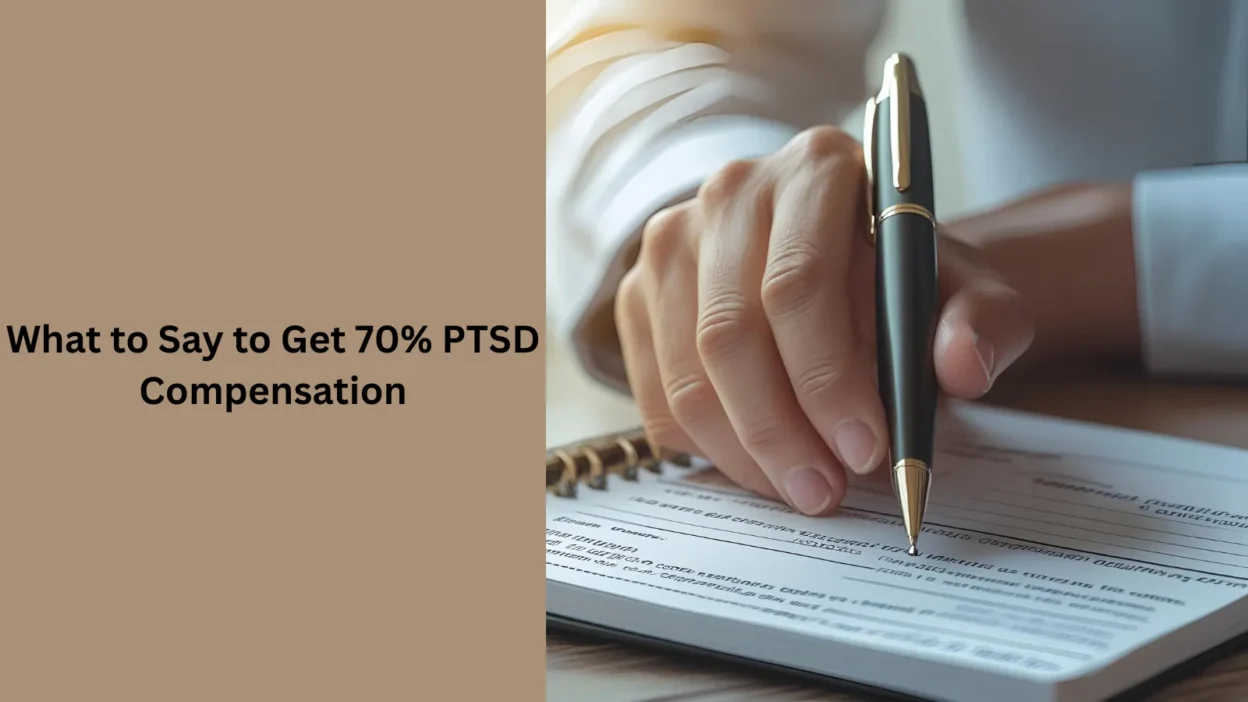What to Say to Get 70% PTSD Compensation is a crucial concern for veterans and individuals seeking fair disability benefits. The language you use during your VA evaluation or C&P (Compensation and Pension) exam can significantly impact your claim.
Describing the severity, frequency, and daily impact of your PTSD symptoms with honesty and clarity is essential. This guide offers practical tips on how to communicate your condition effectively, without exaggeration or minimization. From identifying key symptoms to using VA-specific terminology, we’ll walk you through what to say — and what to avoid.
If you’re aiming for a 70% PTSD rating, understanding how to present your case can make all the difference.
Understanding PTSD Compensation
PTSD compensation is available for veterans and others who have been diagnosed with PTSD as a result of a traumatic experience. The severity of PTSD symptoms plays a significant role in determining the compensation percentage. Understanding what to say to get 70% PTSD compensation involves providing detailed information about how the disorder affects your daily life. A 70% rating is typically awarded when the symptoms are severe enough to interfere with regular functioning, but not completely debilitating.
Be prepared to discuss specific symptoms, such as:
- Difficulty sleeping
- Flashbacks or intrusive memories
- Avoidance of triggers
- Emotional numbness
When communicating with healthcare providers or the VA, ensure that you articulate how these symptoms impact your day-to-day life and relationships.
Accurately Document Your PTSD Symptoms
For a successful PTSD compensation claim, precise documentation is essential. Keep a journal detailing the frequency and severity of your symptoms. Write down how often you experience nightmares, flashbacks, or anxiety attacks, and how they affect your work, family, and social life. In your journal entries, try to note specific events or triggers that worsen your symptoms.
For example:
- “This week, I experienced a panic attack while driving down the highway, causing me to pull over and be unable to continue my trip.”
Documenting such events will help professionals understand the severity of your PTSD and increase your chances of getting the right compensation level.
Explain the Impact on Your Daily Life
When you speak with a VA representative or healthcare provider, you must be clear about how PTSD affects your ability to function. If you’re unable to work, engage socially, or carry out everyday tasks due to your PTSD symptoms, make sure to describe this thoroughly. This may include issues like avoiding public places, struggling with personal relationships, or feeling disconnected from loved ones.
For example:
- “I can’t go to family gatherings without feeling overwhelmed by panic attacks. It has led to isolation and tension with my family.”
Avoid downplaying the severity of your condition. While it’s important to maintain a degree of composure during the claim process, being honest and detailed about your challenges will help the evaluators understand the full impact of PTSD.
Be Honest and Consistent During Evaluations
Throughout the evaluation process, consistency is key. Be honest and transparent about your symptoms, even if they are difficult to talk about. Avoid exaggerating or minimizing your condition; the goal is to paint an accurate picture of your daily struggles.
For example:
- “I’m unable to leave my house most days due to overwhelming anxiety and fear. I’ve been prescribed medication, but it only helps to some extent.”
The evaluators need a clear and truthful account of how PTSD impacts your life, and consistent statements across different assessments will reinforce your claim.
Seek Support from a Mental Health Professional
Having the support of a licensed mental health professional can significantly strengthen your claim. They can provide expert testimony on the severity of your PTSD and its effects on your life. Mental health providers often submit reports outlining their findings based on interviews and diagnostic evaluations.
For example:
- “Dr. Smith’s report indicates that the claimant exhibits signs of severe PTSD, with significant impairments in social, occupational, and personal functioning.”
Their professional opinion can add weight to your claim, increasing the chances of receiving a 70% compensation rating.
Avoid Common Mistakes in the Compensation Process
To successfully navigate the compensation process, avoid common pitfalls such as:
- Downplaying your symptoms: Never minimize your experiences or symptoms out of fear of appearing weak.
- Inconsistent testimony: Ensure that your story remains consistent across all interactions and documents.
- Failure to seek professional help: Engaging with a licensed therapist or counselor can make a significant difference in documenting your PTSD symptoms.
If you make these mistakes, it could hurt your chances of getting the compensation you deserve.
Final Thoughts
Securing 70% PTSD compensation requires clear communication, accurate documentation, and consistent honesty throughout the process. By outlining your symptoms, explaining how PTSD affects your daily life, and seeking professional support, you can ensure that your claim is considered thoroughly.
Remember, your health and well-being are the primary focus, and the compensation you receive will help provide the care and support you need to live your best life.
Don’t hesitate to speak up and share your experiences.




